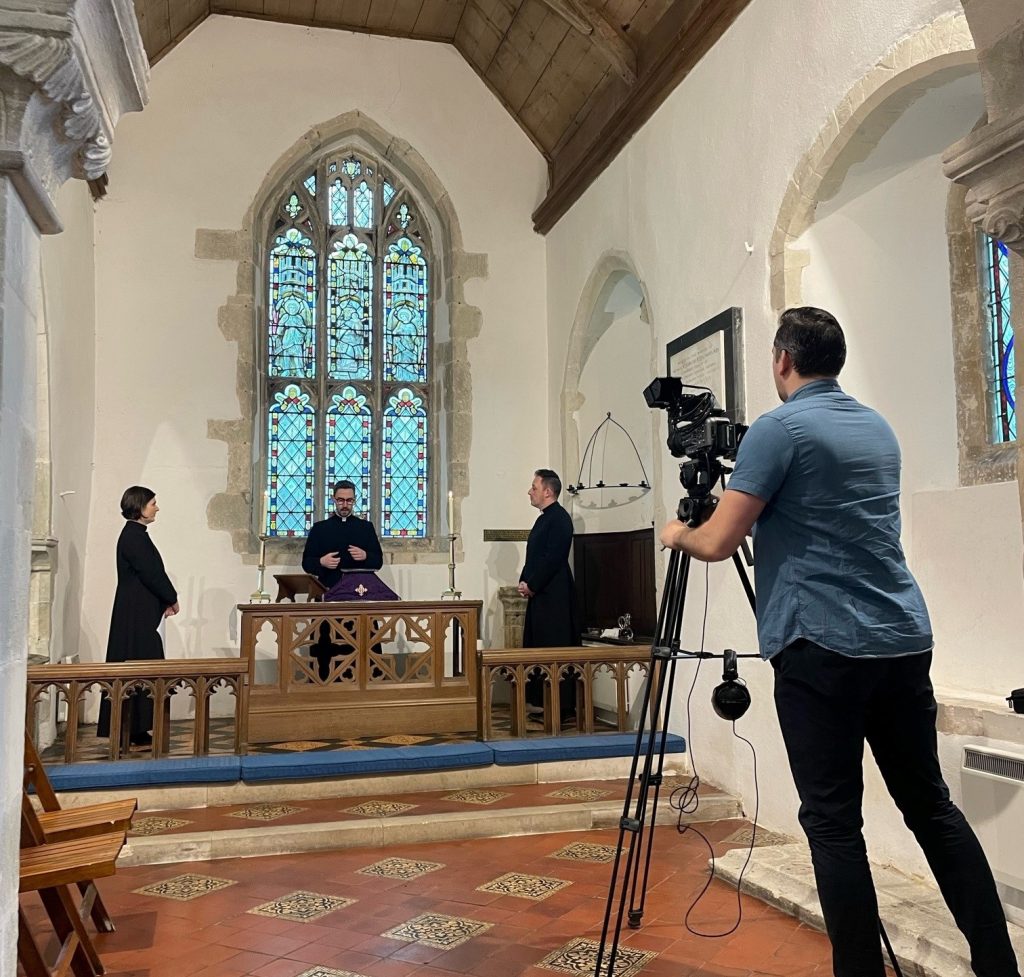Churches are popular film locations, and while you can register your church building with a film location company, many churches will get called up out of the blue with filming requests.
Careful planning is essential. We recommend that you get in touch with your Archdeacon and the Diocesan Communications Team before confirming permission for filming. We can go through the filming request with you, and ensure that you’re comfortable with the proposal and that you have the information you require to ensure the safety of your church, community and those filming. It’s also important to ensure that the filming is in keeping with the Church of England’s ethos and aims.
Remember that you are perfectly within your rights to say no. While you cannot stop a news crew from standing on a public footpath outside with the churchyard as a backdrop, you do have the right to refuse permission to film on church land.
The following guidelines are to assist incumbents, PCCs and churchwardens in the Diocese of Winchester to decide whether to agree to a filming request. You should consider the following questions when responding to filming requests:
Is it Appropriate?
Ask whether the filming is for drama, feature film, news programme, documentary, etc. Request a synopsis, which will give you an overview of the finished programme, and allow you to determine if it’s in keeping with a place of Christian worship. If filming is likely to be lengthy with a lot of action in the church, you may also want to see the actual scripts.
How Long Will it Take?
Ask how long the church is required for. Broadly speaking, a news item where the subject is a Church of England matter and the editor simply wants to use the church as background would not take more than an hour.
However, a feature film or drama will need to light and possibly rig the church before filming could start and it could need de-rigging. The word ‘day’ is often used. You should be clear about what constitutes a day, so you can charge if the company overruns its time. You can also specify time slots or times and days when filming would not be allowed.
What Facilities are Needed?
Does the production company need to use other facilities such as the hall or car park? If filming is likely to be lengthy or for drama, you need to discuss toilet facilities, dressing room areas etc. Use of your hall or car park for such things should be taken into consideration when you negotiate the fee.
Make sure you ask the production company what they have organised for parking. If it is on a street with restrictions, they will need to have gained local authority traffic department approval.

How Much Supervision is Needed?
It is advisable to ensure someone is present during the filming. If it is a day-long shoot, or longer, two people may be needed. These individuals will need to know what agreements you have made with those filming.
Does There Need to be Layout Changes?
What changes are proposed to the way the church is laid-out? You have the right to refuse requests that you are unhappy with or are excessive. If fixed items need to be moved, you are likely to need a faculty. If in doubt, please contact the DAC.
Documentary makers often wish to film a service, for example, a baptism or marriage. In the case of such services you will need the permission of those involved. The company should have their own consent forms but you may also wish to get participants to fill out a church consent form. A film crew will often offer copies of the film in lieu of a fee for the couple. Under those circumstances you are still entitled to a fee.
For any service, you need to agree what is to be filmed and where the cameras will be positioned so that the congregation is not distracted. You also need to ensure that you inform the congregation that the service will be filmed and how individuals can make it clear if they do not wish to be filmed.
Does Your Church Have the Appropriate Insurance?
You must ensure the PCC is insured against damage or accident. Your own insurance policy may not cover you. If you are looking at a substantial amount of filming, it would be prudent to ask the Diocesan Registrar to look over the contract.
It’s also sensible to carry out your own risk assessment and ensure all fire regulations are adequate and up to date. Ensure you have asked the production company for a copy of their insurance and a copy of the risk assessment. Most film companies should have insurance that covers public liability.
What Sort of Contract is Needed?
It is advisable to draw up a contract – it does not need to be lengthy, however it must cover the issues outlined in this guidance document. You may wish to ask the Diocesan Registrar to look over the contract, especially if there are copyright matters. The contracting party for the church should be the PCC, though this is unlikely to be needed if the filming is for short news type pieces.
How Much Will You Charge for Filming?
Time and type of programme are the two main factors determining a location fee.
In terms of filming days, make sure you’re clear what constitutes one day, so you can charge if time is overrun. And if filming at night, ensure this is taken into account. It may be simpler to charge per hour.
Consider an up-front deposit, in addition to pre-payment of up to 50% of the fee. The deposit need not be returnable.
